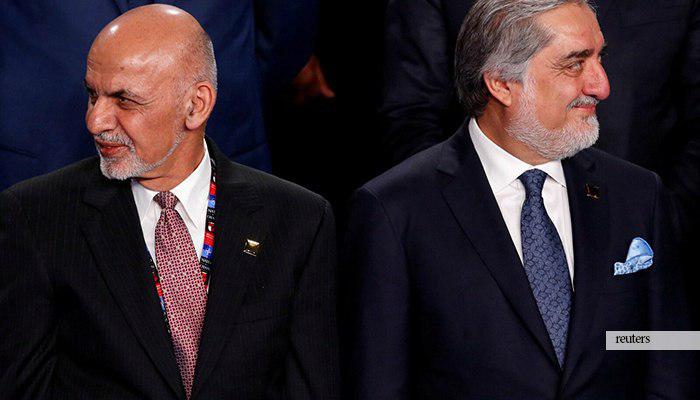Declared as winner of Afghanistan 2019 presidential elections, Mohammad Ashraf Ghani sworn-in as elect president on Monday, March 09, in Kabul while his main contender, Abdullah Abdullah, who contested the election results, took parallel oath of presidency in a separate ceremony held in the Sapidar Palace.
Parallel inaugurations were held after efforts by the US Special Representative for Afghanistan Reconciliation, Zalmay Khalilzad, failed to bring the two rivals together under a political deal.
Ghani’s inauguration ceremony was attended by several foreign diplomats, most importantly by Khalilzad, US Chargé d’Affaires to Afghanistan Ross Wilson, NATO’s top commander in Afghanistan Gen. Scott Miller, UN’s Secretary General’s Special Representative for Afghanistan Tadamichi Yamamoto, and NATO’s Senior Civilian Representative to Afghanistan, Sir Nicholas Kay. Though surrounded by a large crowd of his supporters and prominent political patrons, no foreign diplomat made presence in Abdullah’s inauguration ceremony.
The two leaders, while taking separate oaths, vowed that they would protect the Afghan Constitution and safeguard Afghanistan’s sovereignty.
International reactions to parallel inaugurations
Hours after parallel inaugurations ended, US Secretary of State Mike Pompeo expressed strong reaction against establishing any parallel government structure in Afghanistan. “The U.S. strongly supports a unified and sovereign Afghanistan and opposes any effort to establish a parallel government or any use of force to resolve political differences,” he said in a tweet.
A statement later issued by the US Department of State welcomed Ghani’s statement. “We appreciate Dr. Abdullah’s statement March 9 underscoring similar commitments to peace and inclusivity,” the statement further noted. While swearing in as presidents, Abdullah and Ghani said that they would form inclusive governments and remain committed to achieve a lasting peace.
In a separate tweet, Khalilzad said they would continue to assist Ghani and Abdullah come to an agreement on an inclusive and broadly accepted government. “In their remarks today, both leaders made clear that they are open to negotiations to end the political crisis and that peace and reconciliation is the priority,” he added in his tweet.
UK’s Embassy in Afghanistan has called on Afghan leaders to resolve their differences. “We are concerned by the establishment of a parallel administration,” the embassy said in a tweet posted today, March 10. It further notes that UK continue to push for an inclusive political settlement, protection of rights and freedom and the fight against terrorism.
Ghani’s consecutive setbacks against Taliban
Ghani and his circle echo themselves as defendants of the republic—drawing redline on peace talks with the Taliban, which has been crossed.
Ghani’s spokesperson, Sediq Sediqi, previously had said that Anas Haqqani’s release was redline for the Afghan government, but he was released in exchange for two foreign hostages who were under Taliban custody.
In his first presser, a day after the US-Taliban peace agreement signed on February 29, Ghani publicly said that Afghanistan has not made any commitment for release of the Taliban prisoners and that he had shared it repeatedly with Mr. Khalilzad before the agreement was signed.
However, in his swearing –in statement delivered yesterday, March 09, Ghani changed his position, saying that he will release 5,000 Taliban prisoners in exchange for a significant reduction in violence in the country. The change in position was immediately welcomed by US Department of State and the country’s chief negotiator with the Taliban, Khalilzad.
“We also welcome President Ghani’s announcement that he will issue a decree March 10 on Taliban prisoner release and the formation of a national team for intra-Afghan negotiations,” part of the statement issued by Department of state reads.
Prior to Ghani’s acceptance of releasing the Taliban prisoners, Afghanistan Independent Human Rights Commission (AIHRC) had expressed grave concerns over the issue and asked some questions about it. In reaction to Ghani’s change of stance, the AIHRC has again raised concern. “AIHRC calls on the US, Taliban, and Afghan gov’t to answer critical questions on prisoner release ,” part of the commission’s statement reads, adding that it will continue to advocate for the rights of Afghans throughout the process and calls on all sides to be accountable and transparent to the public regarding the process.




